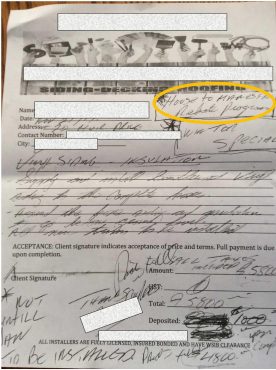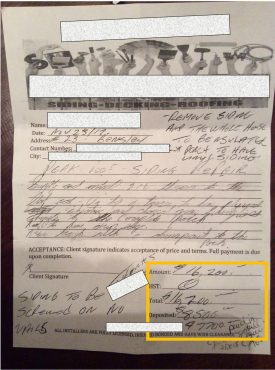
John Bleasby
Convicted contractor back on the tools
Canadian ContractorAn Ontario contractor convicted in 2015 of ripping off his clients is back on the tools, having served his two year probation period.
Contractors found guilty of fraud or consumer deception usually fall off the radar. That’s certainly been Canadian Contractor’s experience when trying to track them down afterwards. Imagine our surprise when a reader contacted us, suspicious about a convicted contractor covered a few years ago. Had he emerged from the shadows of his past? It was something we had to investigate.
It’s important to note that the contractor in question has done nothing wrong at this point. There are no complaints lodged against him or his company. Therefore, we will not reveal his name, his current operating location or the identity of our reader. However, given what we have learned, the man’s past behavior may be on track for a repeat. For that reason, there’s a lesson to be learned and passed on.
An ugly history of deception
Back in 2015, this contractor was convicted under Ontario’s Consumer Protection Act, placed on probation for two years, and ordered to pay a total of $11,200 in client restitution. During the probation period, “he was prohibited from owning, operating or acting as an officer or director in any company that provides home renovation services or other home residential products and services,” according to a media release. “He was ordered to have no association or communication with his co-accused, the consumers, or their families.”
What had he done? The contractor along with a co-accused had, “entered into consumer agreements with 11 consumers [location withheld] for home exterior renovations. Each consumer provided a monetary deposit. In some cases, only the materials were provided. In other cases, the consumers received nothing in return for their deposits. In every instance, the work was not completed and refunds were not provided.”

This so-called contract infers that the work may qualify for a government rebate , possibly the Ontario’s government’s new GreenOn program
(photo has been redacted to protect privacy)
Vague receipts and promises
Our reader became suspicious when a contractor with the same name started soliciting work at their residential trailer park a few hours north of Toronto, although operating under a different company name. Particularly concerning to our reader was the solicitation of work and the taking of large deposits from elderly residents, some in their 80’s, and the issuing of hard-to-read work descriptions. Our reader suggested some of the work already completed for others was questionable in quality. There was more. The contractor was apparently dismissive about the need for building permits. One so-called contract contained a reference to a “rebate program”, possibly the GreenOn energy-efficiency program recently announced by the Ontario government. All so-called contracts indicated that taxes were included in the quoted price.
Park residents take action
Our reader and a fellow resident circulated copies of Canadian Contractor’s original coverage around the park in an effort to inform others of the contractor’s past history. “We did not mention anything about his current company or that people should not hire him,” our reader wrote. “We did however add the telephone number and website [for Ontario Consumer Protection Office] in case consumers had any complaints.”
Not surprisingly, the contractor was unhappy about this. “It wasn’t 15 minutes after we had posted them that he started driving up and down the road,” our reader continues. “He finally went to one of the neighbours and confronted them and said it wasn’t him and that he was going to the police to have us charged with slander.” Apparently his visit to the local police resulted in him having to admit that he was in fact the contractor previously convicted, and in turn being informed by the police that they would not intervene in a civil matter.

Another so-called contract indicates that a deposit of over 50% was paid, and that taxes are included without any breakdown
(photo has been redacted to protect privacy)
Our reader and fellow residents share concerns about the type of client being solicited. “I noticed that one of his trailers was parked around the corner from me at an elderly lady’s place. This lady is well into her 80’s and lives alone. She does have children but I’m not sure where they live. Apparently he is going to put insulation and new siding on and a peaked roof. She paid him up front but I’m not sure how much she paid.”
Residents are now aware
Our reader admits that there really is nothing to be done beyond informing park neighbors. “We got the information out to them and if they still choose to do business with him, it is their choice.” One park resident, however, did take some action to protect their interests. According to our reader, “I heard that he went to one resident that he did work for and wanted the balance owing but she refused because the work was not yet completed. Small victory, I guess.”
Canadian Contractor’s requests to the Consumer Protection Office revealed that the man was presently in the clear. His court-ordered probation has expired, he had made full restitution to the clients bilked in the past, and there are no complaints filed against him or his current company. Until a new complaint is filed, there is nothing anyone can do except to be on their guard. In the meantime, it is concerning to learn that he has been overheard speaking of work underway in three other area residential trailer parks.
What can be learned from this contractor’s behavior?
While legislation and licensing differs between jurisdictions, provincial consumer protection departments across Canada are fairly universal in their recommendations about contracts and deposits. Key elements in a contract should include:
1. Contractor’s name, address and contact information, and any licensing numbers or security deposits required by the province
2. Thorough description of the project, with details of the work to be done and the materials to be used
3. Clear description of any warranties
4. Total cost and terms of payment
5. Work schedule, including start and completion dates
6. Payment schedule, including the deposit amount
7. Who is responsible for clean up after the job is finished
8. List of sub-trades that will be contracted out and who will pay for those sub-trades
9. Details of insurance coverage including current Worker’s Insurance coverage
10. Inclusion of a 10-day cooling off periods, as required across Canada for contracts over $50 signed in the home.

Leave a Reply